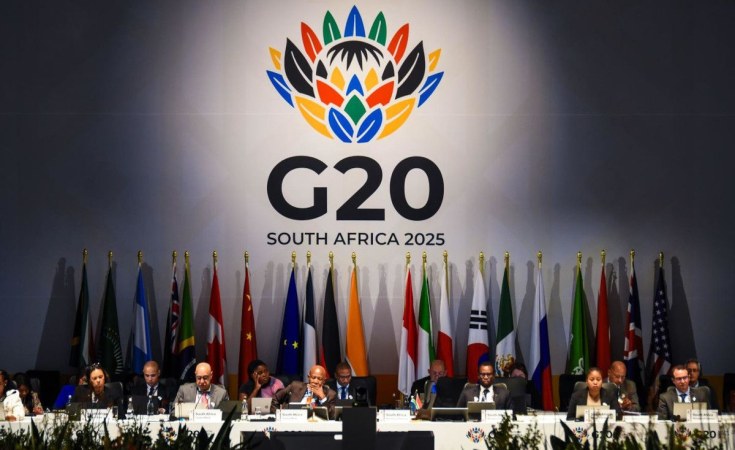Introduction:
The 2025 G20 Leaders’ Summit in Johannesburg was significant for many reasons. It was the first time the G20 convened in Africa, the United States boycotted the meeting entirely, and the final declaration was drafted without American participation. Despite these unusual circumstances, the attending members adopted the 122-paragraph declaration unanimously. The document emphasised multilateral cooperation, representation for the Global South, and reforms in global governance structures.
-
- For India, the summit was an important platform to carry forward the priorities of its 2023 presidency—sustainable development, counterterrorism, capacity-building for the Global South, and reforms in the United Nations Security Council (UNSC). The summit also highlighted new geopolitical tensions: muted references to global conflicts, sharp divergence on climate commitments, and widening gaps between the Global North and the Global South.
- For India, the summit was an important platform to carry forward the priorities of its 2023 presidency—sustainable development, counterterrorism, capacity-building for the Global South, and reforms in the United Nations Security Council (UNSC). The summit also highlighted new geopolitical tensions: muted references to global conflicts, sharp divergence on climate commitments, and widening gaps between the Global North and the Global South.
What Is the G20?
The G20 is an informal platform consisting of 19 major economies along with the European Union and the African Union. Together, they represent around:
-
-
- 88% of global GDP
- 78% of global trade
- Nearly three-fourths of the world’s population
- 88% of global GDP
-
The G20 was elevated to the heads-of-state level in 2008 following the global financial crisis. Since then, the grouping has broadened its agenda to cover trade, health, climate change, energy, agriculture, digital governance, and global inequality.
Unlike the United Nations, the G20 has no permanent secretariat. Its presidency rotates every year and is supported by a “Troika” consisting of the past, present, and incoming presidencies.
Key Highlights of the Johannesburg Declaration:
1. The Spirit of Ubuntu and Collective Action
-
-
- The declaration opened with a strong reference to Ubuntu, the African philosophy that emphasises interconnectedness and shared responsibility. Leaders committed to multilateral cooperation in a world marked by rising conflict, humanitarian crises, and economic instability.
- While the document barely mentioned the Russia–Ukraine war and made no explicit reference to the Gaza conflict, it stated that all nations must refrain from using force to acquire territory—an indirect acknowledgement of current global tensions.
- The declaration opened with a strong reference to Ubuntu, the African philosophy that emphasises interconnectedness and shared responsibility. Leaders committed to multilateral cooperation in a world marked by rising conflict, humanitarian crises, and economic instability.
-
2. Push for Reforming the United Nations Security Council
A major emphasis this year was on UNSC reform. The declaration acknowledged that the body does not reflect contemporary geopolitical realities. It called for:
-
-
- Enlarged membership
- Improved representation of Africa, Asia-Pacific, Latin America, and the Caribbean
- A “transformative” reform process aligned with 21st-century needs
- Enlarged membership
-
This aligns strongly with India’s long-standing position that the UNSC must become more democratic, representative, and legitimate.
3. Clear Condemnation of Terrorism
India succeeded in ensuring that the declaration included a categorical line:
“We condemn terrorism in all its forms and manifestations.”
Though brief, the line is strategically important because several members often differ on defining and addressing terrorism. The declaration also affirmed the need for compliance with international humanitarian law and protection of civilians.
4. Focus on Women and Youth
The document reaffirmed commitments to:
-
-
- Eliminating economic and social barriers faced by women
- Supporting women-led development
- Ensuring meaningful participation of women in political and economic life
- Eliminating economic and social barriers faced by women
-
Youth-related commitments included the Nelson Mandela Bay Target, which seeks a 5% reduction in youth not employed, educated or trained (NEET) by 2030.
5. Climate Action, Green Finance and Just Energy Transitions
Despite resistance from the United States, leaders adopted a climate section focusing on:
-
-
- Scaling climate finance from “billions to trillions”
- Meeting developing countries’ need for USD 5.8–5.9 trillion to implement their climate goals by 2030
- Tripling global renewable energy capacity
- Ensuring just energy transitions, particularly in Africa where over 600 million people still lack electricity
- Scaling climate finance from “billions to trillions”
-
The summit also welcomed the G20 Critical Minerals Framework, which aims to secure sustainable and transparent supply chains.
6. Debt Sustainability and Development Finance
Leaders acknowledged that unsustainable debt in developing nations is constraining growth. They committed to strengthening the G20 Common Framework for predictable and timely debt treatment.
A major financial reform was the creation of a 25th IMF Executive Board chair to enhance Sub-Saharan Africa’s representation.
7. Food Security and Agriculture
With global hunger estimated at around 720 million people in 2024, the declaration reaffirmed the “Right to Food” and supported smallholder farmers, especially across Africa. It also encouraged regional cooperation through mechanisms like the African Continental Free Trade Area (AfCFTA).
8. Digital Governance and Artificial Intelligence
The G20 launched the AI for Africa Initiative, focusing on safe and equitable access to AI technologies. The declaration emphasised:
-
-
- Human rights safeguards
- Transparency and accountability
- Preventing misuse in crime and terrorism
- Human rights safeguards
-
India’s Initiatives at the Summit:
Prime Minister Narendra Modi outlined six major proposals aimed at strengthening cooperation and development across the Global South. These were:
1. G20 Initiative on Countering the Drug-Terror Nexus
India flagged the growing threat of narcotics—especially synthetic opioids like fentanyl—as a major source of terror financing. The initiative seeks cooperation on:
-
-
- Financial tracking
- Border management
- Intelligence sharing
- Law-enforcement capacity
- Financial tracking
-
Fentanyl is an extremely potent synthetic opioid, far stronger than heroin or morphine. It is responsible for a global wave of overdose deaths and has become a critical issue in transnational crime networks.
2. G20–Africa Skills Multiplier Initiative
India proposed training 1 million certified trainers in Africa over the next decade. The initiative uses a “train-the-trainer” model to support sectors such as manufacturing, digital services, and healthcare.
3. Global Traditional Knowledge Repository
India called for a platform to document and preserve traditional knowledge from across cultures, helping prevent biopiracy while promoting research.
4. G20 Global Healthcare Response Team
The proposal aims to build a trained, multinational response force for pandemics and disasters.
5. Open Satellite Data Partnership
India advocated sharing satellite data among G20 space agencies, especially to help developing countries improve disaster response, agriculture planning, and environmental monitoring.
6. Critical Minerals Circularity Initiative
The focus is on recycling, responsible sourcing, and urban mining to support clean-energy transitions.
Alongside these proposals, India also called for:
-
-
- Strict prohibitions on AI misuse
- Human oversight in AI systems
- Responsible AI frameworks
- Strict prohibitions on AI misuse
-
India invited all members to the AI Impact Summit in early 2026.
Challenges Facing the G20:
Despite its influence, the G20 faces several limitations:
-
-
- Geopolitical divisions (Russia–Ukraine, China–West tensions, Middle East conflict)
- Lack of enforcement power, as G20 commitments are voluntary
- Divergent climate responsibilities between developed and developing countries
- US–China rivalry, which often paralyses negotiations
- Debt and financing gaps that the G20 has not fully resolved
- Absence of a permanent institutional structure, which affects continuity
- Geopolitical divisions (Russia–Ukraine, China–West tensions, Middle East conflict)
-
The 2025 summit reflected these tensions. The US boycott and muted language on global conflicts underscored deepening fractures within international diplomacy.
Significance of the G20 for India:
India sees the G20 as essential for:
-
- Advocating UNSC reforms
- Highlighting Global South priorities
- Securing commitments on climate finance
- Strengthening counter-terror and anti-drug frameworks
- Expanding technological cooperation
- Enhancing India’s leadership in global governance
- Advocating UNSC reforms
Conclusion:
The 2025 G20 Summit took place amid geopolitical turbulence, competing global priorities, and an unprecedented US absence. Still, members managed to adopt a detailed declaration anchored in multilateralism, inclusivity, and sustainable development. For India, the summit offered continuity from its presidency and a platform to shape debates on terrorism, skills, traditional knowledge, critical minerals, and global governance reforms. However, the real test will be implementation. As the next presidency passes to the United States, questions remain about whether a deeply divided international system can sustain collective action. The Johannesburg declaration shows that multilateral platforms still matter—but their success depends on sustained political will, trust, and cooperation among the world’s major economies.
| UPSC/PCS Main Question: Discuss the significance of Africa hosting the G20 Leaders’ Summit for the first time. How does the inclusion of the African Union as a permanent member reshape global governance platforms? |









